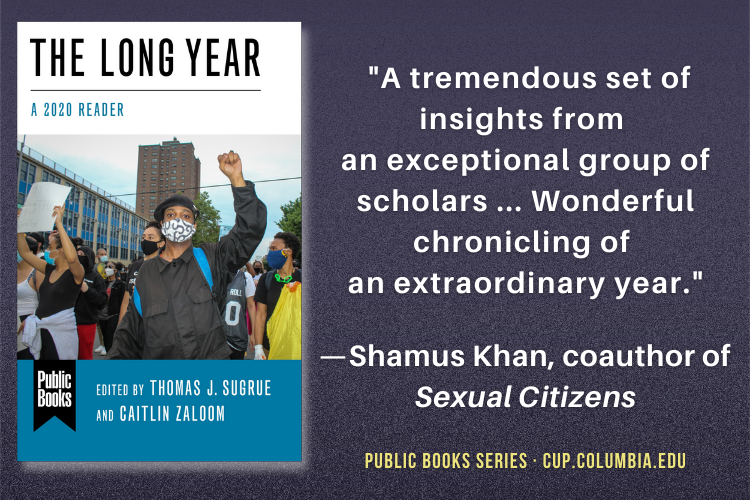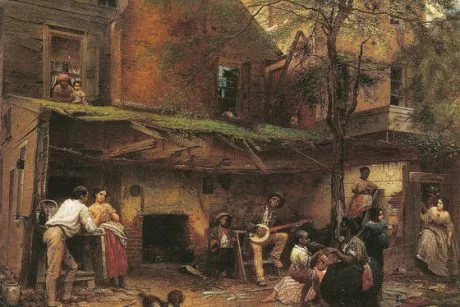My life ain’t a sitcom.” It’s a line delivered by the fictional character Will Smith (played by Jerry Madison Jr.) in a fan-made short titled Bel-Air. Posted on YouTube on March 10, 2019, the film by Black creative Morgan Cooper garnered attention for its reimagining of the 90s television hit The Fresh Prince of Bel-Air (NBC, 1990–96). The original series follows protagonist Will (played by young rapper and burgeoning star Will Smith as a fictionalized version of himself): an African American teen from West Philly who is forced to move from this rough urban area on the East Coast that he calls home to the West Coast, specifically the wealthy Los Angeles neighborhood of Bel-Air. As he raps in the program’s theme song: “I got in one little fight and my mom got scared / She said ‘you’re movin’ with your auntie and uncle in Bel-Air.’” Culture shock ensues as Will navigates his new residence as a transplant. Over the course of six seasons, he ultimately acclimates to a life of privilege among his rich relatives with playful humor. The 2019 fan-made piece, however, eschews comedy in favor of a gritty retelling of Will’s story. But it does something perhaps even more important, too. Cooper’s work provides a metacommentary on television that suggests that the very form of the sitcom—with its formulaic whimsy—simply cannot capture the emotional weightiness of the coming-of-age tale today.
The 3.5-minute film opened up the possibility for further generic reinterpretation of The Fresh Prince of Bel-Air. Cooper generated buzz by producing what was essentially a mock trailer that promoted artistic experimentation with the original program. Indeed, the viral video caught the eye of now-superstar Will Smith. Smith promptly began to collaborate with Cooper to actualize the latter’s narrative vision for an official dramatic reboot of the beloved Black-cast network sitcom. This reboot, which retains the name Bel-Air, premiered on the Peacock streaming service on February 13, 2022.
Bel-Air stands out in a sea of anachronistic and derivative reboots in its refusal to be defined by its televisual past of the ’90s. While the program might pay homage to The Fresh Prince of Bel-Air, it expands the world of the fictitious Will Smith without being tethered to a strict memory of its predecessor.1 But there are limits to this reboot. Bel-Air understands itself as part of a new reign of representation that wields the posture of #Blackexcellence as an aesthetic. The program, while providing a fresh point of view on the original sitcom, also relies on a kind of processed idea of Black identity and culture in the contemporary moment that is wholly unoriginal. Ironically, the drama series fails to truly capture the imagination of the fan film that started it all.
We are in an age of the reboot. Regardless of dubious audience demand, the television industry remakes and revives programs of the past to capitalize on existing IP, in which brand recognition is understood as paramount to success. Yet despite a plethora of these series variously scattered across linear and nonlinear television in recent years, what is most common among them is the whiteness of their source material.
Rebooting seems to mandate whiteness as its default setting. Indeed, there is an increasing amount of reboot TV, broadly conceived, that casts performers of color—so as to promote diversity and inclusion—in roles that were formerly played by white actors. Take Doogie Kamealoha, M.D. (Disney+, 2021–present), which follows Native Hawaiian girl prodigy Lahela “Doogie” Kamealoha as she embarks on a career in medicine as a teenager, just like her pseudonamesake in Doogie Howser, M.D. (ABC, 1989–1993). The new Black-cast version of The Wonder Years (ABC, 2021–present) can be seen as a reparative project that examines African American life in the late 1960s. Black entertainers have even “rebooted” single episodes of The Golden Girls and Friends as organized table reads on Zoom with all-Black ensembles, reciting dialogue verbatim but giving their own spin on beloved characters from these sitcoms.2
Despite these ongoing and one-off projects, original Black-cast or -produced media—such as The Fresh Prince of Bel-Air—inspiring a reboot is a rare luxury. Currently, rebooted Black television is mainly not in the realm of live action, as evidenced by shows ranging from the children’s cartoon The Proud Family: Louder and Prouder (Disney+, 2022–present) to Everybody Still Hates Chris, which has been green-lit as an animated revival of Everybody Hates Chris (UPN, 2005–2006; The CW, 2006–2009). The dearth of Black reboots reveals what programming is considered valuable and worthy of being remade for a new audience.
The vast remediation of Black television culture that does exist might require a shift away from the language of rebooting and the racialized assumptions undergirding it. I want to offer up another term for reviving a media text: refreshing. To refresh means to update, but, even more so, to give new strength or energy to something. Notably, to “be fresh” indicates a cool style and demeanor associated with Black urban experience and especially hip-hop. The refresh of The Fresh Prince of Bel-Air in 2022 acknowledges its inheritance of early ’90s African American cultural expression through rap traditions. The pilot episode of Bel-Air begins as a dream, in a dark templelike space with neon graffiti glowing on columns and walls. Will (Jabari Banks) sits on a throne donning shades and wearing a crown, which recalls the imagery from the title sequence of the original series.
However, this new version exudes an edgy confidence that remixes and attempts to enhance its source material. The sheer swagger of Bel-Air allows for it to resist any sentimental longing for the past. The new opening theme song is the chorus of Easy McCoy’s track “Deja Vu.” And it’s the phrase déjà vu—the feeling of having already experienced a present situation—that also describes how viewers encounter the program. Bel-Air exists in a kind of uncanny valley: scenarios, characters, and relational dynamics are familiar, yet have the capacity to make meaning for audiences differently in their newfound melodramatic expression.
Nostalgia is not the organizing affective logic of Bel-Air as a reboot. But then why refresh the Fresh Prince at all, and why now?
The election of Barack Obama as president of the United States in 2008 altered Black cultural politics, with its fantasy of ushering in a kind of (post)racial exceptionalism. At the same time, the activism of the Black Lives Matter movement transformed perceptions around the prevalence of anti-Black violence. In terms of media representation, the 2022 Bel-Air emerges in a post-Empire (Fox, 2015–2020) televisual landscape, blending the teen angst of All American (The CW, 2018–present) with the multigenerational family soapiness of the short-lived Our Kind of People (Fox, 2021).
It is the latter’s centering of the Black bourgeoisie that is most pronounced in Bel-Air. The Banks’ palatial home is featured prominently, and their upper-class lifestyle is on display through the extravagant mise-en-scène. As Carlton (Olly Sholotan) boasts in the first episode to his siblings, the entire ensemble is an exemplar of “pure, unadulterated Black excellence.” Tanisha Ford writes of Bel-Air, and programs like it, that “these shows are obsessed with cash and glamour, reminding viewers in nearly every scene that African Americans, too, have generational wealth and sophisticated taste.”
The turn toward an aesthetic of Black excellence in television programming makes visible a mode of self-fashioning that is on trend with celebrating neoliberal markers of merit and prestige. Bel-Air perhaps imagines an audience of Generation Xers and millennials who grew up with the sitcom but have now ostensibly achieved a more elite status that aligns with what Alfred L. Martin Jr. conceptualizes as the BLAMP viewer demographic segment: Black, liberal, affluent, metropolitan, and professional. In this way, Bel-Air can dutifully deploy various signifiers that might resonate with this demographic’s aspirational ethos in order to generate authenticity.
Bel-Air became the third original series for Peacock that was a reboot, after Punky Brewster (2021) and Saved by the Bell (2020–2021), both of which have since been canceled. The Black family drama was entirely recast from the mock trailer, but Cooper remained as a writer, director, and co–executive producer. Unlike in the original series, Will doesn’t magically appear on the doorstep of his Uncle Phil’s mansion to inaugurate the fish-out-of-water tale. The first episode of Bel-Air dramatically depicts Will’s backstory, which was highlighted in the lyrics of the OG iconic rap theme song. Viewers are provided a glimpse of the West Philly streets before switching geographies to the lush Los Angeles scenery.
Will is picked up not by a cabbie but by a rideshare driver who is revealed to be Jazz (Jordan L. Jones), a character who audiences might remember as the Fresh Prince’s goofy sidekick from the ’90s sitcom. At his new residence, he soon meets Geoffrey (Jimmy Akingbola), who introduces himself as the Banks’ “house manager” as opposed to the butler, as he did so in 1990. These kinds of narrative tweaks abound in the series.
In this rendering of the Banks family, characters share fundamental personality traits with their former selves, but those traits are given more emotional contours. Philip Banks (Adrian Holmes) is a suave lawyer while his wife, Vivian (Cassandra Freeman), is a sophisticated artist. Their (mostly) stable marriage seems to be modeled off of the Obamas, in both form and function. In terms of their three children, Hilary (Coco Jones) is not the ditzy and vapid caricature from the original series, though in this new installment she is still focused on image and self-presentation as a food influencer with over 75,000 followers on social media that she calls “Hilarystas.” Ashley (Akira Akbar) is a smart and earnest middle schooler who is exploring her sexuality and exudes Black girl magic.
The most interesting character revamp is represented by Carlton, the protagonist’s male cousin and early adversary in the series. Sitcom Carlton is an affable and harmless geek played effortlessly by Alfonso Ribeiro. The character’s dramatic refresh retains his nerdy perfectionism, but tonally he is more brooding than boisterous. In the reboot, viewers learn that he has both an anxiety disorder and a drug habit. He also seems to trade the signature “Carlton dance” for grooving in the middle of a group of mostly white peers as they gleefully sing along to a song that uses the N-word, to Will’s horror, in the locker room of Bel-Air Academy.
The relationship between Will and Carlton is contentious and highlights different versions of Black masculinity. Will is a natural showman who draws attention wherever he goes, while Carlton constantly desires to be recognized and is jealous of his cousin’s charisma. The two relatives operate as friendly foils for each other in the sitcom, but competition drives much of their interactions in the reboot. They are frequently and overtly at odds, socially and politically, as the stakes of the series rise.
Bel-Air understands itself as part of a new reign of representation that wields the posture of #Blackexcellence as an aesthetic.
The traditional sitcom revolves around episodic storytelling, in which narrative closure occurs at the end of each episode. The resolution of conflict after 30 minutes is followed by a sense of amnesia of prior events in the next episode. The Fresh Prince of Bel-Air follows this structure as Will’s various high jinks are presented and played for comedy before a return to stasis each week. The serialization of the reboot—along with Peacock’s weekly episode release that allows for the use of cliff-hangers—provides continuing narrative problematics that pique audience interest in new ways. Cooper states: “Because Bel-Air is a drama, we’re able to really peel back the layers of these characters and themes in a way that you simply couldn’t do 30 years ago in the half-hour sitcom format. We’re able to go have tough conversations that challenge perspectives.”
The extension of Will’s diegetic universe created by the shift in genre is presumed to afford a sustained engagement with issues of race, class, identity, community, and belonging. Heavier subject matter is not relegated to the “very special episode” (such as the infamous one in the original series in which Will gets shot and hospitalized), but rather constitutive to the entire series. There’s no laugh track to provide levity or to comfort audiences after moments of emotional crisis.
Bel-Air nods to serious topics like structural racism when Uncle Phil runs for Los Angeles district attorney and controversially campaigns on “Defund the Police.” Tatyana Ali—who starred as the original sitcom Ashley—guest stars on the reboot in a multiple-episode arc during season two as Ms. Hughes, an instructor at Bel-Air Academy who gets fired from the school due to teaching material outside of the curriculum. Indeed, she gifts her student Ashley with books such as Austin Channing Brown’s I’m Still Here: Black Dignity in a World Made for Whiteness, much to the administration’s dismay. The event becomes a catalyst for protest as the Black Student Union organizes a walkout where they chant that “Black Teachers Matter.” In this instance, the critical consciousness of the teenagers onscreen is an attempt at relevancy in the current political climate.
There is much to appreciate about the dramatic reboot of a program that was defined by its lighthearted exploration of youth rebellion. The shift in genre impacts the way that Bel-Air, in form and content, deals with the complexities of African American experience in the 21st century. Yet even though there are no sitcom elements, Bel-Air does retain a sense of formula in its performance of contemporary Black excellence through characters, themes, and overall iconography for the series.
Bel-Air’s second season finale ends with DJ Jazzy Jeff and the Fresh Prince’s own 1991 rap hit “Summertime” as Will completes his junior year in his new home. It is a curiously dated needle drop for a program that “wills” away its own history in favor of an unabashed presentism. The short film by Cooper that inspired the reboot functioned as a speculative exercise of a fan not beholden to current industry imperatives that promote the churn of textual adaptation. That the resulting flashily designed series does not live up to its potential is indicative of a problem of the reboot program itself. Viewers are compelled to digest a program like Bel-Air as an object of conspicuous consumption for the streaming service. And despite the freshness of the premise, upon watching this reboot of The Fresh Prince of Bel-Air, it quickly becomes stale. ![]()




